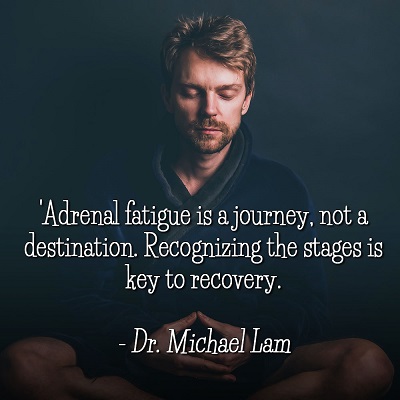 Though not officially accepted as a medical diagnosis, adrenal fatigue is a term referring to a group of symptoms signaling that the adrenal glands are on overdrive and unable to keep up with the amount of strain the body is going through. Fatigue, sleep disturbances, digestive problems, and skin problems are a few of the symptoms associated with adrenal fatigue.
Though not officially accepted as a medical diagnosis, adrenal fatigue is a term referring to a group of symptoms signaling that the adrenal glands are on overdrive and unable to keep up with the amount of strain the body is going through. Fatigue, sleep disturbances, digestive problems, and skin problems are a few of the symptoms associated with adrenal fatigue.
While these stages are not universally accepted within the medical community, the alternative health community has a model that covers the four stages that can occur with adrenal fatigue.
Regardless of whether it is ‘accepted’ as a medical condition or not, adrenal fatigue is known as being ‘real’ and very common nowadays. Here are the four stages involved in the progression of this condition.
Stage 1 – Alarm Reaction
Adrenal fatigue begins as an alarm reaction of the body against stress. At this stage, the body goes into alarm mode and activates the fight or flight response as if to prepare to arm itself against danger. As we deal with everyday stressors, the body’s natural stress response serves as protection. Without it, our body can immediately become vulnerable to attack, disease, or worse, even death.
During this stage, the body gets flooded with stress hormones – cortisol, adrenaline, and norepinephrine. This alarm reaction is considered to be normal and is where all stress responses begin. This is how our bodies naturally react to everyday stressors without necessarily triggering illness. However, a continuous alarm response or chronic stress can lead to the second stage.
Stage 2 – Resistance Response
The next stage of adrenal fatigue occurs when your stress is continuous. The resistance response stage does not eventuate if the adrenal glands are sufficiently given time to recover between stress-inducing events. However, when there are no respite and recovery periods, stress becomes chronic. Eventually, the adrenal glands no longer have the capacity to produce enough stress hormones to meet the body’s demands.
In the resistance response stage, you might notice your level of performance decreasing dramatically. Fatigue is often present and may get in the way of many of your activities. Even though you may catch up on sleep at this stage, you do not feel rested even after having a full night’s sleep. Symptoms of this stage include insomnia, anxiety, irritability, and being more easily prone to catching a cold and infections.
Stage 3 – Adrenal Exhaustion
The third stage of adrenal fatigue is adrenal exhaustion. By now, the adrenals have overworked themselves and are nearly beyond recuperation. With a consistently high level of stress, other circuits in the NeuroEndoMetabolic (NEM) stress response start to become disrupted.
Without knowing there is a problem, you may have gone through a few adrenal crashes by this stage, with recovery from each crash taking more time.
In the adrenal exhaustion phase, organs that are not needed for survival begin to slow down. This phase may affect the reproductive system and other parts of the body that are not necessarily essential to staying alive.
It can disrupt and slow down digestion, where you may experience stomach disturbances and constipation. In other stages, taking stimulants may help to temporarily revive your energy, but in the adrenal exhaustion stage, they will hardly make any difference.
Stage 4 – Adrenal Failure
The final stage of adrenal fatigue is known as adrenal failure or a complete failure of the adrenal glands. Reaching this stage means you have a very serious condition and without the right intervention or method of recovery, you are at great risk of cardiovascular collapse, even death in some cases. At this stage, symptoms can be more severe with the sudden addition of new symptoms that include intense pain in the legs, lower back pain, abdominal pain, severe vomiting, fainting, dehydration, and drops in blood pressure.
In Summary
The adrenal exhaustion condition is differentiated by 4 phases signifying progression at every level. It begins with the chronic dysfunction of individual organs, the first phase, later spreading to multiple organs, which is the second phase. When the body is unable to achieve homeostasis, it crashes when it tries to achieve a state of balance or attempts at any repair.
This is the third phase. Ultimately, the body loses much of its strength and further declines as it gets closer to organ failure. In the fourth and final phase of adrenal exhaustion, muscles get broken down to create more energy.
So don’t wear out your poor adrenals! Look after them, especially by managing stress better, so they can look after you today, tomorrow, and for the rest of your life!






